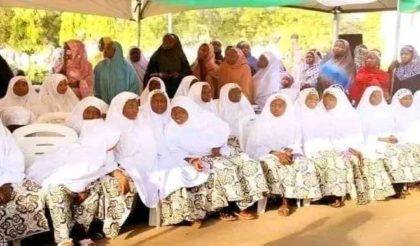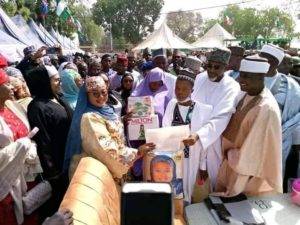The Kebbi State Government orchestrated a grand mass wedding, witnessing the union of no fewer than 300 couples. The momentous event unfolded at the Abdullahi Fodio palace in the Gwandu Emirate, Birnin Kebbi, on a serene Sunday. The driving force behind this initiative is none other than Hajia Nafisa Nasir Idris, the wife of the state governor, who spearheaded the event through her philanthropic endeavor, the Nafisa Nasir Development Foundation (NANAS).
A Noble Pursuit of Social Harmony
Hajia Nafisa Nasir Idris, in her commitment to fortify the foundations of the family unit, organized this maiden mass wedding as a means to address societal challenges. The ceremony saw the convergence of divorces, widows, and indigents, with the overarching goal of fostering social harmony and rekindling the value of marriage within the Kebbi State community. Governor Nasir Idris, who presided over the ceremony, emphasized the importance of couples being confidants and friends to each other, instilling a sense of camaraderie among the newlyweds.
Kebbi State Government’s Pledge to Periodic Mass Weddings
With a forward-looking vision, Governor Nasir Idris, represented by the Speaker of the state House of Assembly, Muhammad Usman-Ankwe, announced a commitment to conducting periodic mass weddings. This initiative is designed to extend support to the less privileged men and women, providing them the opportunity to enter into wedlock. The governor allocated a significant sum of N21 million as dowry for the 300 brides hailing from the 21 local government areas of the state. Each bride was granted a dowry of N70,000, symbolizing the government’s dedication to fostering matrimonial unions and uplifting the socio-economic status of the underprivileged in Kebbi State.

A Financial Boost for Matrimony
The financial commitment of the state administration to the mass wedding initiative is a testament to its dedication to promoting social welfare. By allocating a substantial dowry to each bride, the government not only facilitates the celebration of love but also provides a tangible financial boost to the newly formed families. This investment in matrimonial bonds reflects the belief that a strong family foundation contributes to the overall well-being of the society. The periodicity of such mass weddings further underscores the sustained efforts of the Kebbi State Government in championing the cause of marital unity and social inclusivity.
Mass Weddings: A Social and Economic Catalyst
In recent times, the concept of mass weddings has gained traction as a welcome development, bringing forth significant impacts on both the social and economic fabric of society. Originating in Kano state, the success of mass weddings there has set a precedent worthy of emulation. One must recognize the multifaceted reasons behind the government’s intervention in marriage institutions through mass weddings. In the context of Hausaland, marriage is not merely a personal choice but a form of worship, religiously codified and seen as a means for couples to seek the pleasure of their Lord.
However, the financial burden associated with marriage rituals, particularly for the groom, has become a societal norm that sometimes leads to unintended consequences. The responsibility of providing a suitable accommodation for the bride often becomes an arduous task, compelling families to engage in menial jobs or hawking to meet these social standards. The state government’s decision to subsidize wedding expenses for its citizens is a proactive move to alleviate this burden, ensuring that the commencement of marital journeys is on a comfortable footing for both sons and daughters. This intervention also intersects with the larger societal issue of the clamor for girl-child education, as it addresses the unnecessary financial strain placed on young girls contributing to their own wedding funds.

Government’s Role in Mitigating Divorce Stigma
On the flip side of this societal coin lies the prevalent issue of divorce, especially in regions with a significant Hausa population. The high number of divorcees often faces unwarranted stigma, negatively impacting their chances of remarriage. Recognizing this social problem, the government takes a pertinent step in intervening to alleviate the burden of bride price for prospective grooms and support divorcee women. By providing traditional requirements and business capital, the government not only aids in boosting the prospects of these women but also addresses societal prejudices. This intervention is not just about financial support; it’s a strategic move to empower women economically and socially, fostering a more inclusive and supportive environment for those who have experienced divorce.
Table of Contents
Discover more from OGM News NG
Subscribe to get the latest posts sent to your email.














